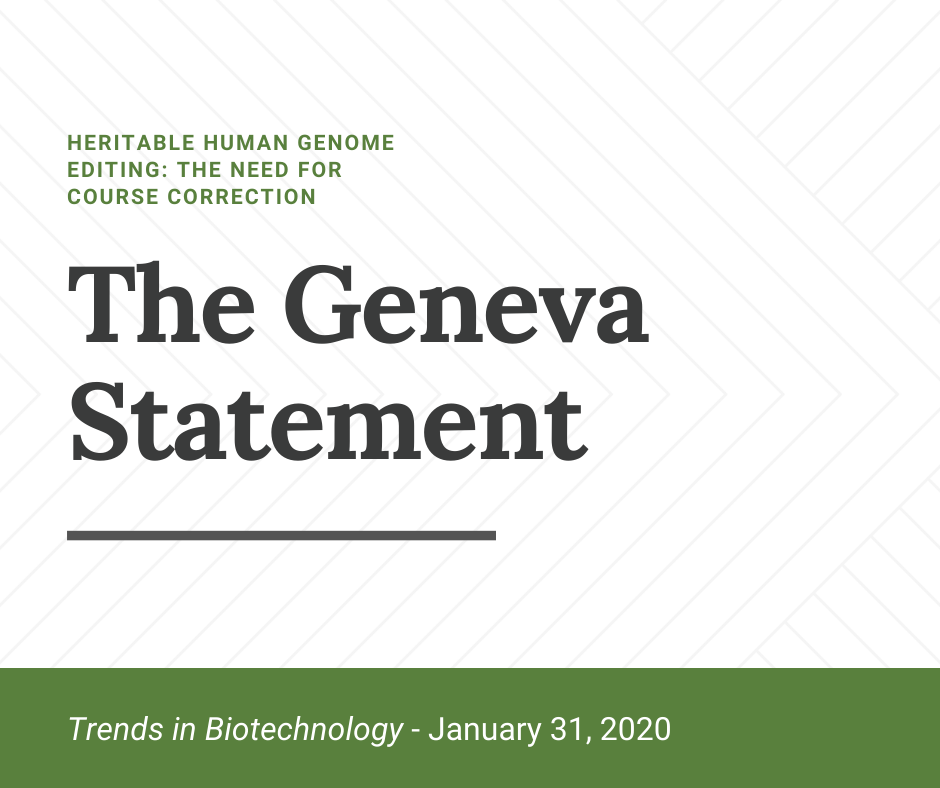International Group Calls for Course Correction on Heritable Genome Editing

FOR IMMEDIATE RELEASE
January 31, 2020
Authors of the “Geneva Statement on Heritable Human Genome Editing: The Need for Course Correction” point to the need to clarify misrepresentations, center societal consequences and concerns, and foster meaningful public empowerment and deliberation on the potential uses of this species-altering technology.
A cohort of influential social scientists, ethicists, life scientists, policy experts, and public interest advocates from around the world has published a robust and cautionary statement about the future of heritable genome editing. The 21 authors aim to disrupt the current trajectory of discussions about heritable genome editing; they demand broad societal consensus before any decision is made about whether to allow the use of this technology in humans.
The full text of the statement will appear in the April 1, 2020, issue of Trends in Biotechnology, and is available online here under an open-access license.
“We’ve heard calls from all quarters for public engagement and participation in discussions about heritable gene editing. But we don’t see inclusive deliberations taking place,” said CGS Project Director on Genetic Justice Katie Hasson. “Small groups of self-appointed elite scientists who want to map out how to use genome editing must not skip over the necessary societal deliberations on whether it should be allowed at all.”
The “Geneva Statement” takes issue with the current state of the deliberations along three dimensions:
- A number of serious misunderstandings and distortions have taken hold in public discourse about this technology. Because legitimate deliberations must be based on accurate information, course correction must clarify misconceptions.
- Most conversations about heritable genome editing neither adequately analyze its societal context nor meaningfully explore its social justice and human rights implications. Course correction must center societal consequences and concerns.
- Public involvement in the decision-making about heritable genome editing is often devalued, undermined, or limited. Course correction must foster public empowerment.
The “Geneva Statement” brings new voices and perspectives, particularly those of social scientists, human rights advocates, and civil society representatives, to a conversation that has so far been dominated by scientists and bioethicists. Despite repeated calls to slow down, diversify, and democratize the decision-making process since the “CRISPR babies” bombshell of November 2018 (when Chinese scientist He Jiankui announced the births of twin girls whose genes he edited as embryos), a panel convened by the US National Academies of Science and Medicine and the UK’s Royal Academies is proceeding with a “translational pathway” for heritable genome editing.
“We need to work toward broad societal deliberations that grapple meaningfully with what’s at stake, including the very real possibility of worsening existing discriminations and disparities,” said CGS Executive Director Marcy Darnovsky. “Bringing heritable genome editing to market could usher in a new form of eugenics, even a genetic caste system.”
The “Geneva Statement” originated during a workshop hosted by the Brocher Foundation in Geneva, Switzerland, which also generously provided financial support for Open Access publication.
Watch a round-table discussion among some of the “Geneva Statement” authors here.
For more information or to speak to a member of the CGS staff about the “Geneva Statement on Heritable Human Genome Editing: The Need for Course Correction,” please contact Katie Hasson: khasson@geneticsandsociety.org.
Geneva Statement Authors:
Roberto Andorno, JD, PhD, Associate Professor of Biomedical Law and Bioethics at the School of Law of the University of Zurich, Switzerland, roberto.andorno@uzh.ch
Françoise Baylis, CM, ONS, PhD, FRSC, FCAHS, University Research Professor, Dalhousie University, Nova Scotia, Canada, Francoise.Baylis@dal.ca, @FrancoiseBaylis
Marcy Darnovsky, PhD, Executive Director, Center for Genetics and Society, USA, darnovsky@geneticsandsociety.org, geneticsandsociety.org, @C_G_S
*Donna Dickenson, PhD, Emeritus Professor of Medical Ethics and Humanities, University of London, United Kingdom, d.dickenson@bristol.ac.uk, www.donnadickenson.co.uk
Prof. Dr. Hille Haker, Richard McCormick Endowed Chair of Christian Ethics, Loyola University Chicago, USA, hhaker@luc.edu, @hillehaker
Katie Hasson, PhD, Project Director on Genetic Justice, Center for Genetics and Society, USA, khasson@geneticsandosociety.org, geneticsandsociety.org, @C_G_S
Leah Lowthorp, PhD, Assistant Professor of Anthropology and Folklore, University of Oregon, USA, lowthorp@cas.uoregon.edu
George J. Annas, JD, MPH, Warren Distinguished Professor and Director, Center for Health Law, Ethics & Human Rights, Boston University School of Public Health, USA, annasgj@bu.edu, @georgejannas
Catherine Bourgain, PhD, Director of the Center for Research in Medicine, Science, Health, Mental health and Society, National Institute of Health and Medical Research (INSERM); France, catherine.bourgain@inserm.fr
Katherine Drabiak, JD, Assistant Professor, College of Public Health and College of Medicine, University of South Florida, USA, kdrabiak@usf.edu, http://katherinedrabiakjd.com/
Prof. Dr. Dr. Sigrid Graumann, Professor for Ethics and Director of the Protestant University of Applied Sciences Bochum, Germany, graumann@evh-bochum.de
Dr. Katrin Grüber, PhD, Director of the Institut Mensch, Ethik und Wissenschaft, Germany, grueber@imew.de, www.imew.de
Dr.phil. Matthias Kaiser, Professor; Centre for the Study of the Sciences and Humanities (SVT), University of Bergen, Norway, matthias.kaiser@uib.no, @matthiaskaise14
Dr David King, Director, Human Genetics Alert, London, UK, david.king@hgalert.org
Regine Kollek, PhD, Professor for Technology Assessment of Biotechnology in Medicine, Hamburg University, Germany, kollek@uni-hamburg.de
Dr. Calum MacKellar, Director of Research, Scottish Council on Human Bioethics, Scotland, Calum.MacKellar@schb.org.uk
Jing-Bao Nie, BMed, MMed, PhD, Professor at Bioethics Centre, Dunedin School of Medicine, University of Otago, New Zealand; Adjunct Professor at Peking University Health Science Center, China, jing-bao.nie@otago.ac.nz,
*Osagie K. Obasogie, Haas Distinguished Chair, Professor of Bioethics, University of California, Berkeley, Joint Medical Program, School of Public Health; Senior Fellow, Center for Genetics and Society, USA obasogie@berkeley.edu
Dr. Mirriam Tyebally Fang, Institute of Biomedical Ethics and History of Medicine, University of Zurich, Switzerland, mirriam.tyebally@ibme.uzh.ch
Gabriele Werner-Felmayer, PhD, Professor, Institute of Biological Chemistry and Bioethics Network ethucation, Medical University Innsbruck, Austria. gabriele.werner-felmayer@i-med.ac.at
Jana Zuscinova, former Political Advisor to Chair of EPP Working Group on Bioethics and Human Dignity, European Parliament, jzuscinova@gmail.com
*These authors were unable to attend the workshop at the Brocher Foundation in Hermance but were involved with the planning and preparation of the meeting and manuscript.



